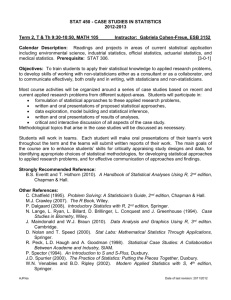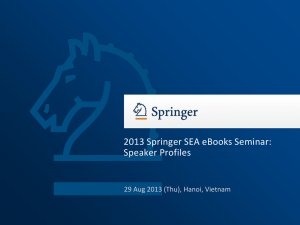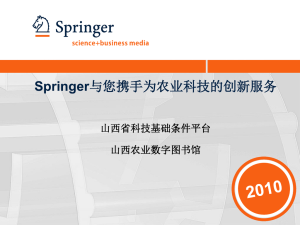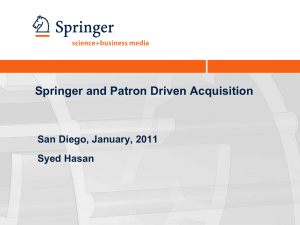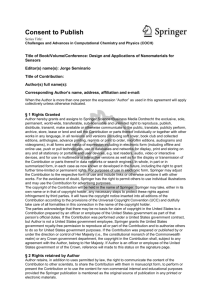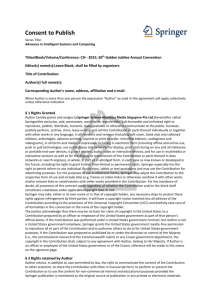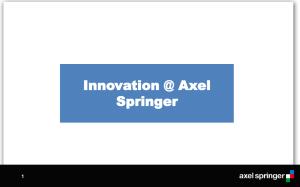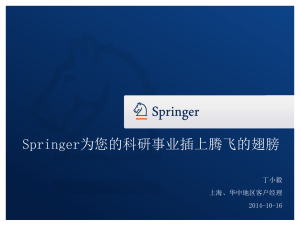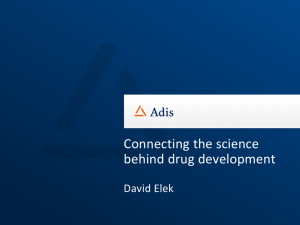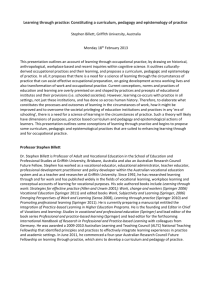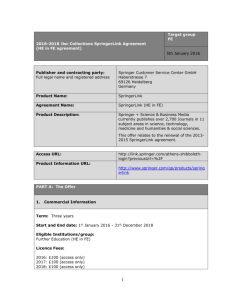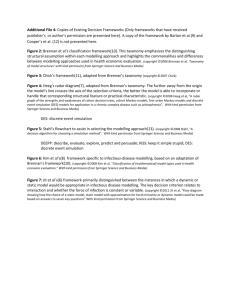639._org_ Springer Science+Business Media Full name: Annika
advertisement
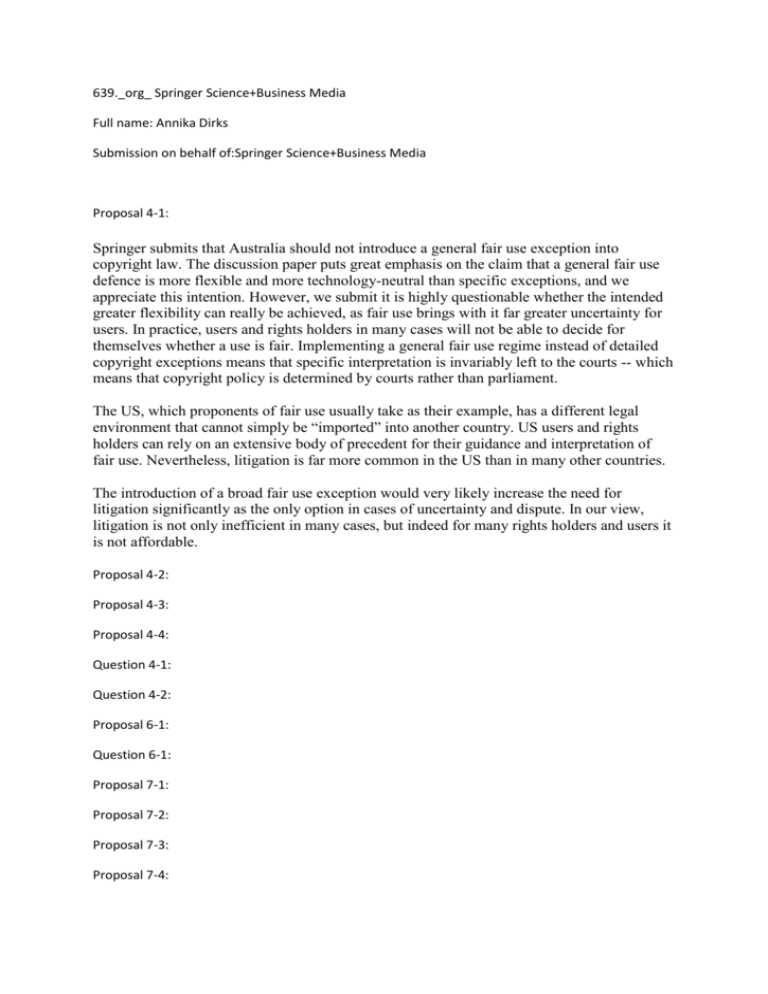
639._org_ Springer Science+Business Media Full name: Annika Dirks Submission on behalf of:Springer Science+Business Media Proposal 4-1: Springer submits that Australia should not introduce a general fair use exception into copyright law. The discussion paper puts great emphasis on the claim that a general fair use defence is more flexible and more technology-neutral than specific exceptions, and we appreciate this intention. However, we submit it is highly questionable whether the intended greater flexibility can really be achieved, as fair use brings with it far greater uncertainty for users. In practice, users and rights holders in many cases will not be able to decide for themselves whether a use is fair. Implementing a general fair use regime instead of detailed copyright exceptions means that specific interpretation is invariably left to the courts -- which means that copyright policy is determined by courts rather than parliament. The US, which proponents of fair use usually take as their example, has a different legal environment that cannot simply be “imported” into another country. US users and rights holders can rely on an extensive body of precedent for their guidance and interpretation of fair use. Nevertheless, litigation is far more common in the US than in many other countries. The introduction of a broad fair use exception would very likely increase the need for litigation significantly as the only option in cases of uncertainty and dispute. In our view, litigation is not only inefficient in many cases, but indeed for many rights holders and users it is not affordable. Proposal 4-2: Proposal 4-3: Proposal 4-4: Question 4-1: Question 4-2: Proposal 6-1: Question 6-1: Proposal 7-1: Proposal 7-2: Proposal 7-3: Proposal 7-4: Proposal 8-1: Proposal 8-2: Proposal 8-3: Consistent with our view that fair use should not be adopted in Australia, we believe “fair use factors” would be too broad and too indefinite to be included in an exception for “nonconsumptive” use – all the more so since the definition of non-consumptive use is also too broad and unspecific. If “non-consumptive use” is meant to cover text and data mining, we submit that text and data mining is much more easily arranged by license. Licensing solutions for text and data mining are currently developing rapidly, and where the text and data mining usage is noncommercial and purely for scholarly purposes, Springer like many other publishers would be ready to support such activities. A prerequisite is that the user has subscribed to the body of data or text concerned, and that platforms and digital systems are not overstrained by this use. Again, licensing is the best solution to ensure responsible and controlled access. Proposal 9-1: Proposal 9-2: Proposal 9-3: Proposal 9-4: Proposal 9-5: Proposal 10-1: Proposal 10-2: Proposal 10-3: Proposal 11-1: Proposal 11-2: Proposal 11-3: Question 11-1: Proposal 11-4: Proposal 11-5: Proposal 11-6: Proposal 11-7: Proposal 12-1: Proposal 12-2: Proposal 12-3: Proposal 13-1: Proposal 13-2: Proposal 13-3: Proposal 14-1: Proposal 14-2: Proposal 14-3: Proposal 15-1: Proposal 15-2: Question 15-1: Proposal 15-3: Question 15-2: Proposal 16-1: Question 16-1: Proposal 16-2: Question 16-2: Question 16-3: Proposal 17-1: Springer (as most other STM publishers) relies on licensing to develop and provide innovative business models for the digital economy. Contracts and licensing allow specifically defined and tailored agreements and therefore enable legal certainty that exceptions often do not give. Where copyright exceptions are allowed to overrule commercial terms, this is likely to lead to disagreements between rights holders and users about the scope and reach of exceptions. To the extent that this proposal would limit the freedom of users and rights holders legally to agree on permitted uses, and that it would create doubt over the enforceability of contractually agreed terms and conditions, the law of Australia might become less attractive as a choice of law. Additional comments?: Springer Science+Business Media (Springer) is a leading global scientific, technical and medical (STM) publisher, providing researchers in academia, scientific institutions and corporate R&D departments with quality content via innovative information products and services. The company is headquartered in Berlin, with major editorial offices in London (UK), Dordrecht (Netherlands) and New York (US). It has operations in about 25 countries around the world, and some 7,000 employees. In 2011, Springer acquired MPS from Wolters Kluwer, including the highly-regarded portfolio of Adis journals based in Australia and New Zealand. Springer published roughly 2,200 English-language journals and more than 8,000 new books in 2012, and the group is home to the world’s largest STM eBook collection, as well as the most comprehensive portfolio of open access journals. In 2012, Springer Science+Business Media generated sales of approximately EUR 976 million. Springer appreciates the opportunity to submit comments on the discussion paper Copyright and the Digital Economy. The framework of copyright serves as a flexible and essential basis for evolving business models. Springer is convinced that rather than watering down copyright in an attempt to simplify the use of works in a digital environment, it is essential to support the development of userfriendly and innovative business models for digital works. The STM industry is highly dynamic and innovative, combining scholarly communication and information technology. Springer, like many other STM publishers, invests considerably in digital products and services, and in doing this adds value to the distribution of scholarly content and the user experience on the internet. We have embraced the opportunities of the digital environment early on, introducing our online platform SpringerLink as early as 1996. We rely on a stable framework of copyright law to continue to innovate – and on licensing as flexible and able to accommodate various business models, ranging from subscription to purchase to rental to open access. Springer’s eBooks are an example of a digital product with liberal copyright policies. When an eBook package is sold to a library, this includes unlimited concurrent access on SpringerLink and the use in course packs. The eBooks come without digital rights management, which means researchers and students can print or simply copy the eBooks on a USB stick to take home. Library patrons may also buy a print-on-demand copy of the eBook (called “myCopy”) at a strongly discounted price. The success of our eBooks packages and popularity with librarians and readers alike reinforce our belief that targeted, liberal product policies work much better than blanket exceptions to copyright. File 1: File 2:
